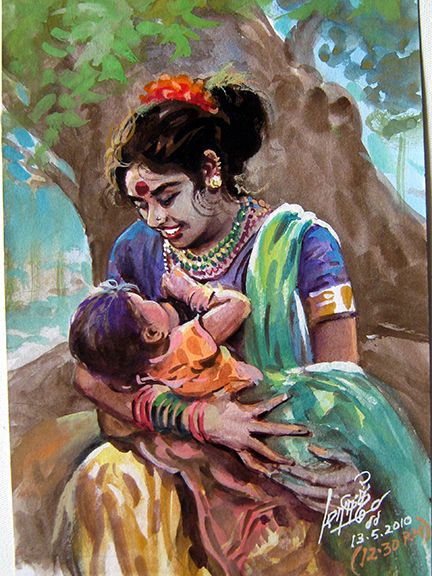पृथिव्यां पुत्रास्ते जननि बहवः सन्ति सरलाः
परं तेषां मध्ये विरलतरलोऽहं तव सुतः।
pṛthivyāṃ putrāste janani bahavaḥ santi saralāḥ
paraṃ teṣāṃ madhye viralataralo’haṃ tava sutaḥ।
मदीयोऽयं त्यागः समुचितमिदं नो तव शिवे
कुपुत्रो जायेत क्वचिदपि कुमाता न भवति ॥३॥
madīyo’yaṃ tyāgaḥ samucitamidaṃ no tava śive
kuputro jāyeta kvacidapi kumātā na bhavati ॥3॥
Oh Mother, there are many sons of yours in this world who are simple-minded, but among them, I am the rare deviant, a restless one.
It’s not appropriate for you to forsake me like this, oh Shiva, for a bad son may be born, but a bad mother doesn’t exist anywhere.
Devyaparādhakṣamāpana stotram

या जनयति सा जननी – The one who gives birth – is a mother.
The word for mother is uncannily similar in most languages. While they may vary slightly, and language theory attributes the commonality to the Indo-European stream, there seems to be more to it.
Mm – the sound – is made by pursing the lips, and then releasing them for the aa sound. Babies practice this movement of the lips instinctively, when they feed on milk from the time they are born.
It is no wonder then that the ‘mā’ sound came to denote mother, since this is the first natural movement of the parts of the mouth that later help in speech.
The connection of a child to a mother is instinctive in animals, but goes beyond that in humans. Partly because of the extended period of “getting ready for the world’ that human babies undergo, and partly because of our search for meaning in every relationship that we come across.
And so it seems comical that one has to pick a day to celebrate relationships, be it mothers, or fathers, or lovers, or friends.
Such celebrations should continue unabated throughout life, every day of your life, for such relationships are a product of our emotions, and our emotions bring the ‘human’ bit to an otherwise glorified social animal.
We humans have a capability to remember, but a tendency to forget. We remember the mother who gave us birth, but conveniently forget the mother who gave us everything else – the motherland, and Mother Earth.
The mother nourished us, but the motherland nourished the mother too. It gave us shade from the sun, water to drink, food to eat, a place to live, an opportunity to study…
Mother Earth is where we all are born from, and where we all will go to rest.
It’s easy to make Mother’s Day cards (or WhatsApp messages, as it stands today) and give them a bunch of roses, but do we truly understand the richness of that relationship that we share not just with our Janani, our mother, but mother India, and Mother Earth as well?
Give it a thought today, and everyday, when you can.
